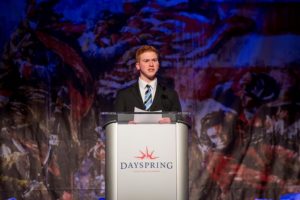One of the distinctive attributes of Dayspring Christian Academy is the annual writing and presenting of the oration. The oration is a two-step process, the writing phase, and the public speaking phase. Webster defines an oratory this way:
The art of speaking well, or of speaking according to the rules of rhetoric, in order to persuade. To constitute oratory, the speaking must be just and pertinent to the subject; it must be methodical, all parts of the discourse being disposed in due order and connection; and it must be embellished with the beauties of language and pronounced with eloquence. Oratory consists of four parts, invention, disposition, elocution, and pronunciation.
Before I began working at Dayspring four years ago, I was a Dayspring parent. Two of my children graduated from Dayspring Christian Academy, and they each wrote multiple orations. Both moved on in the competition, and one spoke at Dayspring’s annual Patriot’s Celebration Dinner. I am very familiar with the challenges and frayed nerves associated with the Headmaster’s Oration Competition. When my son presented his oration in his 11th-grade year, I was so nervous for him that I could not finish my dinner. I vividly remember my daughter in the spring of her fourth-grade year, draped backward over the plaid ottoman in our family room, tears streaming, face red with frustration, declaring her eternal hatred of oration writing. At that moment, I shared her feelings completely. But, we got through it. We got through it every year, and every year it got easier and the quality of their writing and speaking got better. A lot better.
Fast forward eight years or so, and I’m sitting in that same family room, talking with my daughter on the phone. She is in her dorm room at college, chuckling at an assignment she had just received. “Mom,” she exclaimed. “We have to write a six-page paper and present it in front of the class. My classmates are freaking out! I told them that I had to do this every year since second grade and that I had just presented a 20-page paper before a panel of teachers. This is nothin’!”
The oration process is challenging, but it is one of the hallmarks of the Principle Approach and an element that makes a Dayspring education distinct. I have come to appreciate the oration process and have personally seen the fruit in my own children and in my students. Challenges build character, and the oration process is an excellent exercise for a child to be stretched in his abilities and to work through fear and frustration.
Dayspring’s oration founding document states the purpose of the oration process this way:
In order to be prepared to give a sound and noble defense of the hope that lies within him, each Dayspring student learns the art and science of oratory. This engages the student in the rigors of “taking [his] every thought captive to the obedience of Christ,” expressing his position in written form, then presenting his well-reasoned Biblical worldview before an audience so that his listeners will contemplate a change of viewpoint, thereby reconciling them to God in fulfillment of The Great Commission (II Corinthians 10:5b; II Corinthians 5:20; Matt. 28:18-20).
The founding document goes on to describe the oration process:
Spring – The Writing Phase
- The oration writing project is part of the English curriculum and is graded as part of the third trimester English or Literature (H.S.) grade.
- One aspect of the oration writing project relates directly to Bible class. Upon timely request by the English/Literature teachers, Bible teachers should provide one or two class periods during which they will help each student gain a Biblical perspective of his oration topic by assisting him in identifying the Biblical truths and principles that govern and/or undergird his topic. This work and conclusions drawn should be evaluated as part of the third trimester Bible grade.
- Research: All student arguments should be supported by facts obtained through research, according to grade level expectations.
- Teachers will prepare students for the oration by reviewing its definition, purpose, sample readings, etc.
- Each student in grades 2 – 11 will submit a final version of his oration according to the writing process and deadline expectations set by his English teacher. Students will follow MLA standards for both writing and citation.
- Length: Grades 2-3: Written orations should be between 100 and 150 words in length. This will translate to approximately 2-3 minutes of speaking time. Grades 4-5: Written orations should be between 200 and 500 words in length. This will translate to approximately 3-5 minutes of speaking time. Grades 6-8: Written orations should be between 500 and 800 words in length. This will translate into approximately 5-7 minutes of speaking time. Grades 9-11: Written orations should be between 600 and 1000 words in length. This will translate into approximately 6-8 minutes of speaking time.
 Fall – The Public Speaking Phase
Fall – The Public Speaking Phase
- Teachers will instruct students in the art of delivering an oration (elocution) through demonstration and practice.
- Teachers will hold in-class oration presentations by all students in mid-September. Students will receive a grade in English or Literature for the oral presentation of their oration at this time.
- The teacher will determine which orations (in addition to all semi-finalist orations) will be included in the annual school publication, The Legacy.
Headmaster’s Oration Presentation
Purpose: To determine oration presenters for the annual Patriots Celebration Dinner from each Division:
- Division I – Grades 3-4
- Division II – Grades 5-6
- Division III – Grades 7-9
- Division IV – Grades 10-12
At the conclusion of the fall classroom oral presentations, the teacher will select approximately four presenters from his class for the Division competitions that will be held in a chapel-type setting. All grade-level teachers will judge in these semi-finalist assemblies in early October.
Each Division will typically have four students in the school-wide competition at an all-school assembly. All available faculty will judge in this finalist assembly in mid-October, in order to select students to present their orations at the Patriots Celebration, Remember America, and other Dayspring events.
The oration process is tangible fruit of Dayspring’s aspiration to teach children to reason from Scripture and relate what they have learned with poise and eloquence. The hope is that children will glean from this process the knowledge and ability that will lead them to agree with the apostle Peter when he exhorted Christians to “Sanctify Christ as Lord in your hearts, always being ready to make a defense to everyone who asks you to give an account for the hope that is in you, yet with gentleness and reverence.”

